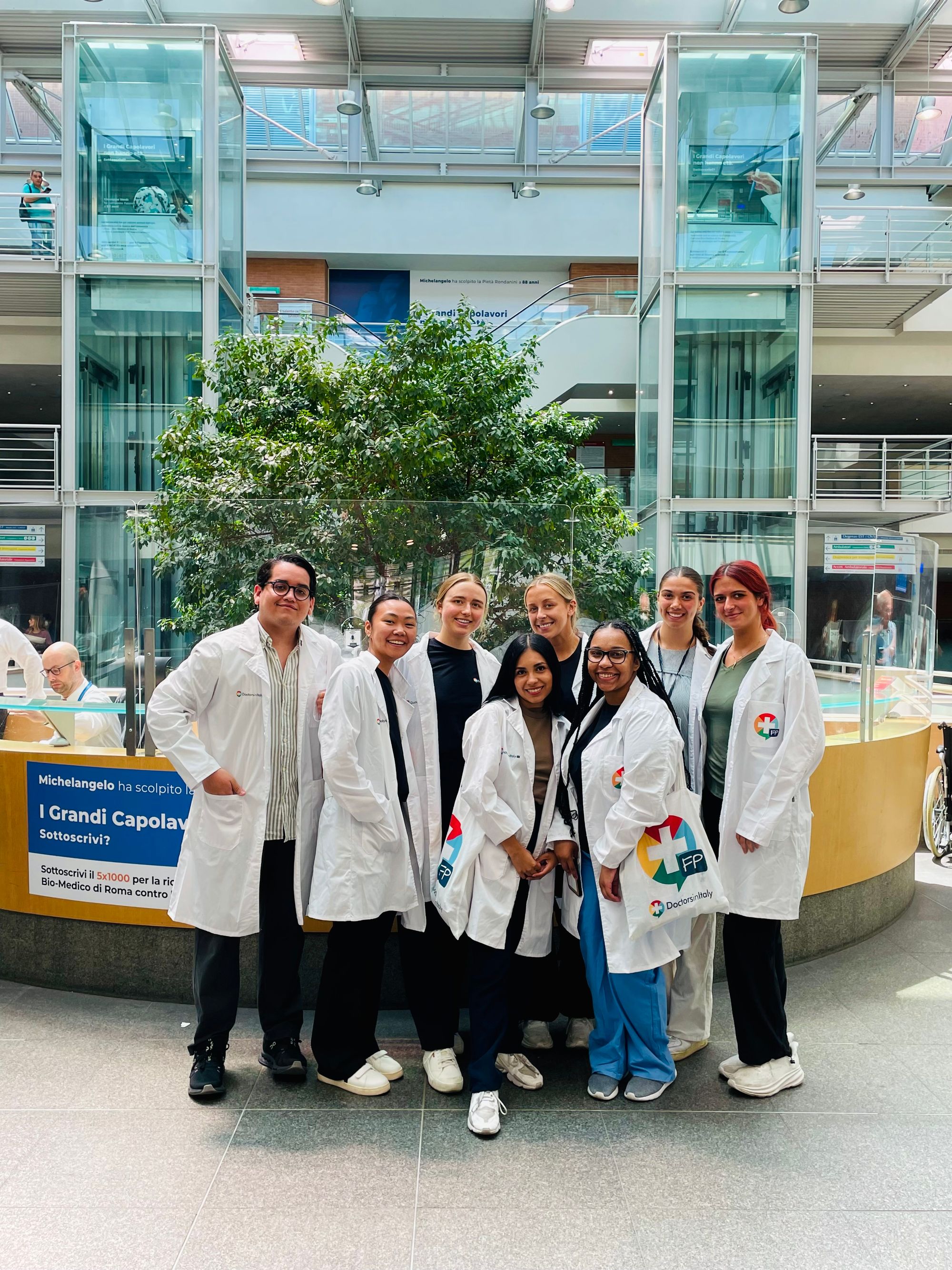 Right most: Tiffany Tran, UAB biology studentTiffany Tran, a senior from Athens, Alabama, majoring in biology, spent three weeks in Rome, Italy, availing the unique opportunity to shadow physicians at a prestigious Italian hospital, Policlinico Campus Bio-Medico, gaining hands-on experience in global health care. The trip expanded her cultural literacy and informed her career aspirations of becoming an optometrist.
Right most: Tiffany Tran, UAB biology studentTiffany Tran, a senior from Athens, Alabama, majoring in biology, spent three weeks in Rome, Italy, availing the unique opportunity to shadow physicians at a prestigious Italian hospital, Policlinico Campus Bio-Medico, gaining hands-on experience in global health care. The trip expanded her cultural literacy and informed her career aspirations of becoming an optometrist.
Tran, a student on the pre-optometry track at the University of Alabama at Birmingham, was exposed to the Doctors in Italy Fellowship during her junior year in a biology class with Megan Gibbons, Ph.D., assistant professor in the College of Arts and Sciences’ Department of Biology.
“I was already looking for shadowing experiences when Dr. Gibbons said Doctors in Italy was a once-in-a-lifetime opportunity and encouraged students to apply,” Tran said. “As I’m a hands-on learner, it immediately caught my interest as I was intrigued by the idea of shadowing overseas. I applied and got accepted.”
It was an eye-opening experience for Tran as she compared the American health care system with the Italian health care system. She observed stark differences in the path to medical school and about the operational aspects of health care.
“In Italy, the path to medical school does not involve getting an undergraduate degree first,” Tran said. “Students go into professional schools directly after college, which is comparable to high school in the United States. The path is about six years long, and these students are required to log more clinical hours of hands-on medical practice early on than American institutions.”
Connect with the UAB Office of National and International Fellowships and Scholarships to explore transformational opportunities.
Tran mentioned how the American health care system is more commercialized than what she observed in Italy.
“In Italy, if someone needed a procedure done, they provided it to the patients regardless of costs and the patient’s financial standing,” she said.
Tran shadowed a variety of doctors such as ophthalmologists and otolaryngologists and was inspired by their patient-centered, empathetic care. Tran observed empathetic care through a physician’s kind explanation of the treatment plan to a nervous patient. Compassionate patient interactions like these solidified her resolve to pursue a career in medicine.
Tran grew up with a service-oriented mindset, and shadowing experiences in Italy furthered her passion to serve the under-resourced communities. For example, one of the doctors she shadowed personally provided transportation and free surgery to a patient who desperately needed treatment but could not afford it.
 Tran with her fellow shadowers in Rome, Italy. According to Tran, the physicians were committed to helping her learn from their medical practices. On her last day, one of the doctors especially came to Tran, reassuring her of her choice to pursue a career in optometry.
Tran with her fellow shadowers in Rome, Italy. According to Tran, the physicians were committed to helping her learn from their medical practices. On her last day, one of the doctors especially came to Tran, reassuring her of her choice to pursue a career in optometry.
“The physicians would provide an overview of the procedures that they were going to perform before the surgery,” Tran said. “Then, they would guide me through the process step by step, followed by a debrief in the end, which significantly increased my knowledge about medical surgeries — especially eye surgeries.”
These experiences have enhanced Tran’s medical knowledge in a cross-cultural setting, nurturing her passion for medical service. She has gained valuable insights into surgeries, eye care and meaningful doctor-patient interactions.
“The most valuable thing I have learned is that patients can make mistakes; but as physicians, we have to ensure that we approach our conversations with compassion,” Tran said. “For example, there was a patient who did not follow instructions to abstain from eating or drinking before the procedure. Despite the frustration, the doctor spoke to the patient compassionately to come up with a new plan.”
In addition to gaining valuable insights into an international health care system, Tran explored the historical sites of Rome, enjoying authentic pasta –– her favorite part of the trip.
Encouraged by her fascination for eyes and her health care experiences, Tran aspires to go to an optometry school and eventually open her own eye care practice.
“The reason someone should choose medicine has to be helping and benefiting people,” she said. “And that is my purpose.”